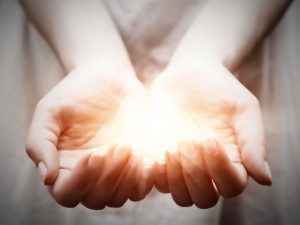 stock.adobe.com
stock.adobe.com
A REFLECTION FROM THE CHRISTIAN TRADITION
“I GIVE WHAT I HAVE”
By Thomas P. Bonacci, C.P.
I heard a report the other day that touched my heart. The report observed that many people were feeling frustration. This is completely understandable when you consider all the restrictions that are now in place. Something so simple as grocery shopping has turned into a potential life-threatening situation. Some necessities are in short supply, entertainment is closed, larger family gatherings are dangerous, and even places of worship are closed. No wonder so many feel frustrations. But the report was not about the inconveniences or limitations that seem so obvious. Many people are expressing their frustration that they could not do more to help others who were suffering. I was deeply moved.
We easily become aware of our limitations in times of crisis. We wish we could do more to help. Research has shown that people frequently imagine themselves in the profession that is needed most in times of upheaval. I remember, for example, when my grandmother’s house burned to the ground. Not only did I want to be a firefighter, I even imagined that I was one. The little boy simply wanted to help. Pause and think for a moment of the times in your life you wished you could do what helps most. Here is where we find our sense of compassion, our empathy and care for someone who is hurting or in need.
Sometimes it happens that people confuse limitations (powerlessness) with shortcomings (faults). We can feel a sense of guilt when we can’t do more. Nonetheless, both these feelings testify to our growing consciousness and our desire to be and do the best we can.
St. Peter, in the Acts of Apostles 3: 1-10, experienced his own sense of limitation. He realized he had nothing to give the poor crippled man who was begging for help. Peter had no silver, no gold. He had nothing that would benefit his poor friend except for the treasure in his heart. In Acts of Apostles 3: 6 Peter says, “What I do have, I give you!” Peter blessed the man in the name of Jesus. He could rise up and walk. Peter transcended his limitations and even his shortcomings. There is a profound invitation here. Whenever we feel limited, powerless, failed, or weak, it is an invitation to seek out what we do have. Never be hesitant to give what you do have in the treasure chest of your heart.
Sometimes when you have nothing to give, no gold, no silver, no talents, no gift, give the greatest gift of all – yourself. Peter gave what he had, according the Acts of Apostles, at the gate called “Beautiful.” It is always a beautiful thing when we share who we are with others.
Thank you for being a beautiful people, a wonderful community, a generous person in the self-giving of yourself no matter what the limitations. Together let us make every day a time to do something beautiful for one another.
Be at peace, deep peace.


Off